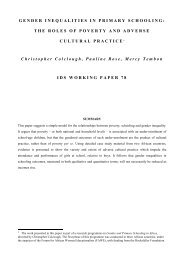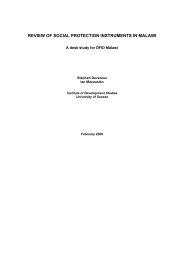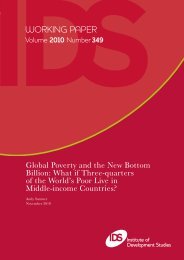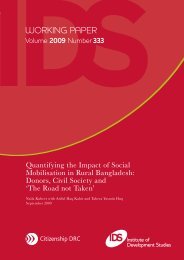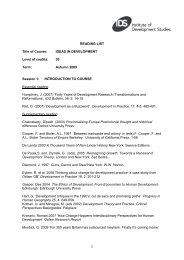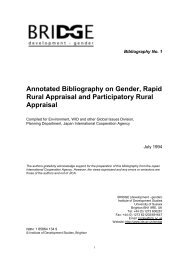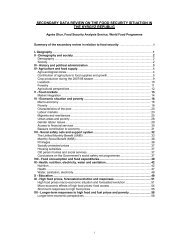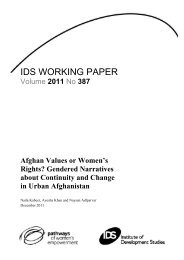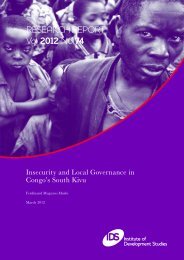1 'Troubling race. Using Judith Butler's work to think about racialised ...
1 'Troubling race. Using Judith Butler's work to think about racialised ...
1 'Troubling race. Using Judith Butler's work to think about racialised ...
Create successful ePaper yourself
Turn your PDF publications into a flip-book with our unique Google optimized e-Paper software.
colour means blackness - or non-whiteness. 2 It would seem that there was nothing for a<br />
parent <strong>to</strong> do but <strong>to</strong> step back and keep quiet. Seeing physical (<strong>racialised</strong>) differences is<br />
clearly much more contentious and complicated than seeing gender differences. This did<br />
not produce a <strong>to</strong>tal denial of difference, however. Difference has instead been redefined,<br />
with its boundaries redrawn. The key term here is culture. Rather than speak of <strong>race</strong>,<br />
many of the interviewees would focus instead on questions of cultural difference. This<br />
raises the question of what this notion of ‘difference’ is different from. Are we all<br />
different in our own ways or is there an undefined (unseen) core from which ‘others’ are<br />
demarcated by their ‘difference’? In Butlerian terms, is there a realm of the abject which<br />
is defining the boundaries of whiteness?<br />
Heather was the only interviewees who was prepared <strong>to</strong> suggest that her baby had a<br />
strong reaction <strong>to</strong> the visual impact of <strong>racialised</strong> physical differences and skin <strong>to</strong>ne in<br />
particular:<br />
Heather “I’ve just got one, and she’s 10 months - although you do get an interesting<br />
reaction that she definitely ... we have a couple of black friends but not a lot of ... so she<br />
tends <strong>to</strong> stare at black people.”<br />
BB “Really...”<br />
Heather “Because they’re different, so she’s aware there’s something different. We had<br />
a guy come round <strong>to</strong> do a survey - we seem <strong>to</strong> be on everyone’s survey list, and he was, I<br />
<strong>think</strong> he was probably Nigerian ‘cos he was very, very dark, you know, with that almost<br />
navy blue, it’s so black, and she was absolutely transfixed. Completely fascinated<br />
because it was different, it was something new, which was what babies absolutely love, so<br />
it was interesting <strong>to</strong> see that they are aware, that people look different. [...] You know,<br />
it’s very obvious, it’s like she’d stare at somebody with glasses or at somebody that had<br />
very, very bleached blonde hair or something. They’d all be things that would be eyecatching<br />
<strong>to</strong> her, so that she would, you know, comment on it in her way.<br />
(Interview 15)<br />
Heather does feel the need <strong>to</strong> assert her baby’s innocence - the attention she gives <strong>to</strong> black<br />
people is no different from that she would give <strong>to</strong> blonde or glasses wearing people. The<br />
fact that she says this perhaps suggests a level of anxiety <strong>about</strong> it. Although at the same<br />
time she suggests a possible social explanation in that part of her daughter’s interest is<br />
due <strong>to</strong> the infrequency of her daughter meeting people who have darker skin than her.<br />
Other interviewees, whose children also commented on <strong>racialised</strong> physical differences,<br />
were also at pains <strong>to</strong> point out that the lack of racism underlying these comments. Asking<br />
<strong>about</strong> the colour of a person was the same as asking <strong>about</strong> the colour of a <strong>to</strong>y only<br />
“probably even more interesting” (interview 17), or commenting on someone’s skin<br />
colour “that’s just the same as them saying they’ve got blonde hair” (interview 20). It is<br />
interesting how in two of these examples, what comes <strong>to</strong> mind as a contrast <strong>to</strong> blackness<br />
is blonde hair - perhaps an iconic formulation of whiteness.<br />
2 See (Dyer 1997, p46-48) on white as a colour.<br />
9



